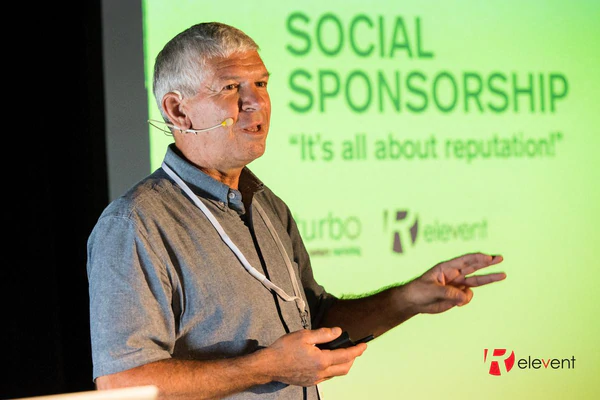How to build a social conscience for your brand

by Loretta Di Vita
He may exhibit a direct manner and the super-charged energy of the Tasmanian Devil on a sugar rush, but Pierre Ladouceur also has a sensitive side that doesn’t take long to surface. Beneath the callous of drive and experience, he is somewhat of a—softie.
Hearing him speak easily of “emotional resonance,” “a better world for all,” and “developing sustainable environments,” it quickly becomes apparent that he truly cares about everything that is worth caring about these days. So it’s no surprise that even his marketing company has—as he puts it—”heart.”
Indeed it was this social conscience, coupled with entrepreneurial flair that led him ten years ago to set up Turbo Marketing to “help companies define and communicate their social and environmental commitments.”
Long before Ladouceur landed at the doorstep of the advertising world, it seemed a given that he would follow in his family’s footsteps and become a medical doctor just like his parents and both grandfathers. However, medical school turned out to be only a stopover as he realized his future was in sales and marketing.
Like many life changes, the detour has served him well and, in the process, he’s accumulated roughly three decades of industry savvy, heralding back to what he describes as the “Mad Men” days of advertising, with Young & Rubicam, the Toronto ad agency.
“Yes, it was very much like what the TV series portrayed,” he reminisces, hinting at an industry zeitgeist which would now be considered indiscreet at best.
“Fun and games…and great learnings in the basics of advertising,” is the banner he ascribes to the bygone phase of his career.
Does he ever miss the frisky era of in-office dalliances, crystal liquor decanters, and tobacco-stained fingertips?
The seasoned pro speaks fondly of his heyday—having also worked with agencies in Montréal; followed by 19 years with McDonald’s in Canada, the U.S., and Europe; and later as a VP of Marketing, Communications and Sales with the Canadiens de Montréal hockey enterprise—but embraces the here-and-now of his career.
In more recent years, he has witnessed firsthand some seismic shifts in the advertising and marketing landscape. Not only have the norms of office behavior changed in the wake of political correctness, but industry attitudes have evolved too. And this is a refreshing development in his opinion.
“I love the fact that companies are now strongly encouraged to concretely act in the social arena and communicate their actions. Times have changed because marketing has evolved and created new powerful tools for consumers. And citizens have their own social media now and can react if companies are not authentic and transparent and actively helping to create a better world,” he says.
At the Relevent Conference, Ladouceur’s presentation focused squarely on the topic of reputation within the context of sponsorship marketing, and echoed the leitmotif of social connectivity also examined by other speakers.
“I wanted to communicate clearly that a company’s reputation is of the utmost importance. There was a time when you did not communicate your social actions. Now, you must. Citizens require it,” he says.
According to Ladouceur, reputation is so important that it can actually precede the inherent value of a product or service, and even supersede it as a determinant of consumer buy-in. Of course, consumers will always seek the ideal of product and service integrity plus social integrity, but as they become more engaged, corporate reputation will become a weightier behavior- and choice-driver.
“Consumers want to know about your reputation and message before even looking at product or service offers,” he says bluntly.
But defining the message is only half the battle, Ladouceur warns. For it to have social significance and resonate on a broad level, it has to be delivered and disseminated in the appropriate ways.
As he explains, “You do not communicate a social engagement in the same fashion or tone and manner as a commercial commitment. That’s why Turbo has progressed in helping companies not only to decide on their social commitments, but how to communicate them in the social arena.”
Solid corporate reputations don’t just blossom naturally. They require in-house cultivation in the form of top-to-bottom adherence to a clearly defined set of values. Moreover, an organization needs to develop not only character, but also strategy. And this is where social sponsorship fits into the grand strategic scheme.
“It’s a well-known fact that traditional ‘commercial’ sponsorships and partnerships can provide visibility and promotional benefits to a company. But ‘social’ sponsorships, involving causes and non-profit organizations, can provide rich transfers of social values—which, in turn, can enhance corporate reputations,” explains Ladouceur.
While smart companies aim to influence consumers, brilliant ones consider all stakeholders—including employees. Ladouceur suggests that effective social sponsorships can be a great bonding agent—the glue in the family—keeping all stakeholders equally engaged and on the same page.
“A logo on a rink-side banner is cool, but a partnership with a cause with strong human and social values will benefit a company’s image and reputation among important stakeholders…not least, its own employees,” he says.
Furthermore Ladouceur posits that a company that aligns itself with a sound cause is not only promoting social advancement, but is insulating itself against adversity and any ensuing fall out. The assumption is that on good days, consumers will be supportive of a company with a good reputation; and on bad days, they’ll be more inclined to overlook or forgive the missteps of an organization associated with redeeming social initiatives over an insular one without such ties.
Inarguably it’s an unpredictable, whacky world where things can go haywire in the blink of an eye. So the question is posed to Ladouceur: What then if circumstance or bad decision-making manifests itself in the form of a crisis—one which shakes the foundation of a brand or (shudder) topples it to the ground?
“Every company faces tough times at one point or another and a strong corporate reputation becomes very important in these times,” he affirms. “Mistakes happen; but you can salvage a reputation that has suffered.” His reassurance is based on the belief that just like good intention is a consumer-valued proactive measure, it’s also appreciated after the fact.
But player beware. Ladouceur underlines that any recoup strategy must be not only honesty-based but also case-specific because insincere off-the-shelf PR spins can be just as damaging as the crisis itself—or worse. Social-minded consumers are becoming increasingly adept at sniffing out corporate posers and, consequently, are more inclined to shame them through social media. Conversely, an appeased consumer can be a brand’s best publicist.
“People are not fools. They will react positively to a company that acknowledges mistakes and has the will to correct them in an honest, transparent, authentic fashion,” he says.
Ladouceur points to Southwest Airlines as an example: “In July of 2013, Southwest Flight 345 landed nose first at LaGuardia airport. Southwest Airlines demonstrated how a quick response and constant, open communication can aid in the recovery from a PR crisis. Southwest released on their social media accounts shortly after the incident and Southwest’s quick response, honesty, and frequent updates resulted in most responses being thankful and positive, keeping the brand’s reputation intact.”
Granted all this talk of goodness induces the same warm and fuzzy feeling as YouTube videos of kittens playing with yarn, but can an organization ever go overboard with good deed? Could noble corporate effort, in some ironic twist of stakeholder wariness or skepticism, end up being perceived as the cover-up of a dirty conscience?
After a thoughtful pause, Ladouceur replies categorically, “No, I do not believe so.” In his view, there’s no such thing as too much of a good thing. “The key is doing it right,” he affirms.
And doing it right is self-admittedly the way he tackles all things—both “commercially and personally.”
From Ladouceur’s lips, to the corporate world’s ears: “I hope that companies would create a new job title. In addition to CEO, COO, CFO and CMO, companies should create a CRO―’Chief Reputation Officer.’ That’s a job I would love for myself!”
